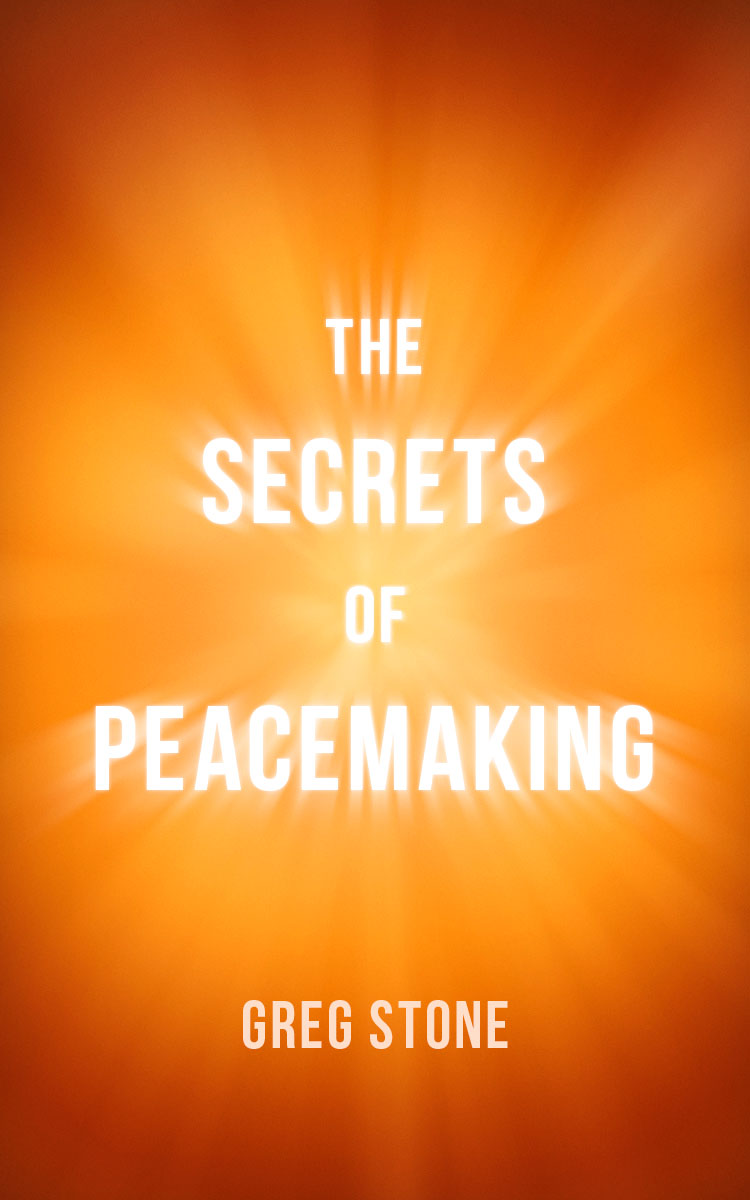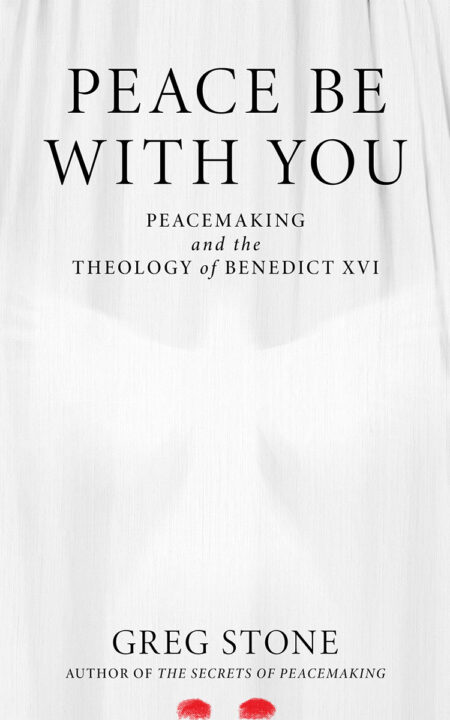The Secrets of Peacemaking transcends mundane conflict resolution approaches. This short work explores the foundational principles of peacemaking, which arise from man’s essence as an immortal soul. The conflict resolution protocol presented illuminates the path to the Peace of Christ in this world. Secrets provides mediators, reconcilers, peacemakers, and disputants with the core faith-based concepts needed to bring about enduring world peace.
Interview with author Greg Stone
TTWI: What inspired your latest book, The Secrets of Peacemaking?
GS: After Taming the Wolf was published I delivered seminars and workshops on conflict resolution and peacemaking. I often presented to seminarians and clergy. I became acutely aware of the need for a book on the theological and philosophical foundations of peacemaking. [Note: I have subsequently authored Peace Be With You: Peacemaking and the Theology of Benedict XVI, which fleshes out the concepts presented in Secrets.
TTWI: Did you turn to a particular theology?
GS: Yes, the theology of Benedict XVI. He has renewed and revitalized Christian theology. His theology is rooted in the works of the earliest theologians and in scripture. He provides keen insights into the core tenets of the faith. His intellectually sound and uplifting writings fully illuminate Christianity. Unfortunately, too few people, including clergy, are fully aware of his profound theology.
TTWI: How does Benedict XVI’s theology address peacemaking?
GS: He presents a dialogical theology — a theology of relationship. He sees divine relationship, a relationship with God, as the core of our entire existence. All other relationships are built on this foundation. Our relationships and dealings with our fellow humans must mirror this fundamental divine relationship. In divine relationship we access divine love and come to understand its vital role in bringing peace to human relations.
TTWI: So relationship represents the intersection of peacemaking and theology?
GS: True. In Benedict’s theology we encounter basic truths about relationship. These truths become critical — as peacemaking ministry focuses on repairing and reconciling relationships. The ministry, guided by theology, seeks to heal human relations and reconcile divine relationship.
TTWI: That makes sense.
GS: Benedict XVI, the premier theologian of our time, provides us with the deepest possible understanding of relationships. He speaks to the core concerns of peacemakers. Benedict XVI’s applied theology informs peacemaking — like no other resource.
TTWI: So you’ve written a book on peacemaking and the theology of Benedict XVI?
GS: Yes and no. I have written a book on peacemaking and the theology of Benedict XVI — but it remains in draft form. It needs editing and polishing. But, as I was finishing that book, which runs over 300 pages, I sensed there was a need for a shorter work. People were not reading as much as they once did. It made sense to condense key concepts into as few pages as possible. [Note: Peace Be With You: Peacemaking and the Theology of Benedict XVI is now available.]
TTWI: The Secrets of Peacemaking is that shorter work?
GS: Yes. I was determined to present key peacemaking concepts in a book with less than 100 pages. It was a challenge, as these are very complex concepts. But I wanted to satisfy the demand for shorter works. I had to boil the concepts down to their core essence.
TTWI: Will readers appreciate this approach?
GS: I hope they appreciate the brevity. At the same time, the material is so dense they will be forced to pause and reflect. Some paragraphs supply sufficient content for an entire weekend retreat. Readers are encouraged to see this book as a retreat tool.
TTWI: So a great deal of information is packed into a few pages?
GS: Secrets requires a fair amount of “unpacking.” Readers are invited to expand their understanding through hands-on practice. They will need to allow the fundamental concepts to breath during retreats and during their practice. This approach of learning-by-doing is common when one works with applied theology.
TTWI: Applied theology? Can you explain?
GS: In the early church all theology was applied theology. It was intended to help people live a better life. Theology, the study of the nature of God and man’s relationship to God, is a study that should be applied to living.
TTWI: For the most part, we do not see theology that way today.
GS: Theology became academic or scholastic. One entire school of theology became known as Scholasticism. Theology became divorced from the lives of most people. The discipline was controlled by small circles of academics. Benedict XVI changed that situation — his work harks back to the early theologians who intended for theology to be applied.
TTWI: Do you feel Benedict XVI has been successful?
GS: Yes, to an extent. He compiled a theology that can be applied, a theology that should be applied. He has produced an amazing body of powerful work.
TTWI: Is this work well known?
GS: Growing illiteracy among Catholics, and all Christians, has created a problem. Benedict XVI writes at a very high level, intellectually. At the same time, the work is inspiring and spiritually up lifting. But people cannot access this rich legacy if they cannot or do not read. We need to do our part to improve theological literacy.
TTWI: Benedict XVI has given us an applied theology that is vital for peacemaking — we just need to apply it?
GS: He presents the ultimate understanding of relationship — he provides insights that can be applied to reconciling with God and to resolving conflict with one’s our fellow humans. There is a natural fit between peacemaking and his applied theology.
TTWI: But does success in peacemaking rely on an applied theology?
GS: Yes. But to understand the vital link, we have to engage in reflection. Contemplation leads us to an important discovery: the path to peace parallels the path to salvation. And the two paths eventually converge. These two endeavors — making peace and seeking salvation — go hand in hand. This is one of the more important secrets of peacemaking. This discovery leads us to conclude that only a faith-based approach leads to real peace — to the Peace of Christ.
TTWI: But surely that idea does not garner universal agreement. The culture does not see the world in that manner. You will run into stiff opposition.
GS: That’s very true. In Secrets I address the problems that arise from conflicting worldviews. We may start with a practical peacemaking axiom — in order to resolve conflict we must work within reality. We seek real results in the real world. If we ignore reality or operate with a faulty view of reality, peace eludes us. In other words, success relies on our moving away from fantasy or from altered reality. We seek to see things “as they are.”
TTWI: But how do you define reality? You turn to philosophy?
GS: Yes, in a way. A philosophy simply states how one views reality. Every philosophy makes claims about the nature of reality. A philosophy may be formal and academic. Or it can be informal and personal. Or it can be largely unstated, a collection of unvoiced opinions that guide how one lives. As a bottom line, it is a view of reality.
TTWI: And a person’s philosophy affects how they resolve conflict?
GS: When peacemakers resolve conflict they explore how the parties view reality. They ask, what is true for a party and what is false for them? Often the conflict has its roots in the different ways people see reality. A peacemaker helps them explore different perspectives. Peacemakers help them enter into dialogue about how they view the world.
TTWI: Some peacemakers treat all worldviews as equivalent or of equal value. But that’s not your approach?
GS: Some philosophies are so at odds with reality that they become conflict drivers. They depart so severely from a comprehensive sense of reality that they create chronic disharmony. For example, they offer a faulty view of the nature of man, which leads people to fight against their true nature. Promoting a false view is like blindfolding drivers and setting them on a racetrack. There will be crashes.
TTWI: Care to name any villains?
GS: Philosophical materialism is the leading culprit. It’s the primary worldview of the contemporary culture. Materialism argues the universe sprung into existence spontaneously as a result of material causes — it just popped into existence all on its own.
TTWI: It seems you also object to materialism’s view of human nature.
GS: Humans are seen as bio-robots subject to bio-determinism. In this view, there is no such thing as free will and no soul. Human lives are the sum total of material processes. All human ideas and beliefs simply emerge from underlying material conditions. Materialists consider that the correct mix of neurons and brain chemicals forms your beliefs — for example, your belief in God. In this view all Creation is one giant mechanical accident — an accumulation of mindless matter. You get the idea.
TTWI: And that hampers peacemaking?
GS: Such views spawn destructive approaches. “Peacemakers” take up coercive and manipulative techniques. They see man as a herd animal, as someone to be controlled and prodded. Love, especially divine love, slips out of the equation.
TTWI: A different philosophy is required for success?
GS: Peacemakers need a philosophy that describes a comprehensive reality — one that includes both natural and supernatural elements. This philosophy — Christian Idealism — advances the idea that all Creation emerges from the Mind of God. This is the same view one finds in scripture. Benedict XVI marries such Idealism with faith to arrive at the deepest possible understanding of Creation and the nature of man.
TTWI: Can the combination — philosophy and theology — deliver practical results?
GS: In peacemaking we must produce real results. Transformation must occur. Reconciliation must take place. Peacemaking tools must be practical. Secrets describes an accurate reality in which peacemaking is possible. It is a practical approach that blazes a path leading to the Peace of Christ.
TTWI: Anything else we should know?
GS: Peacemaking is not easy. Today’s world would not be in such a mess if it were easy. Rather, the challenging truths that make peace possible have been buried for a very long time. That is why we call those truths The Secrets of Peacemaking. This new book unearths such truths to lay a foundation and a path that are vital for anyone seeking the Peace of Christ.
TTWI: Will you be providing more information about this new book?
GS: Episodes of the podcast Peace Be With You will focus on The Secrets of Peacemaking. Those upcoming episodes will help shine light on these vital truths and what they mean for our world today.


